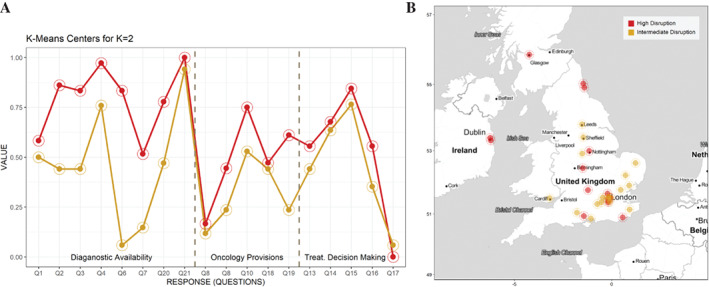Editor
Over 42 000 colorectal cancer (CRC) cases are diagnosed in the UK each year. Multiple hospital and patient factors are involved in the safe functioning of colorectal cancer (CRC) services, most of which the COVID-19 pandemic has impacted1. The literature so far has sought to predict the potential disruption in surgical and cancer care during the pandemic2–4. We have evaluated the degree of adherence and deviation from the best practice guidelines and to describe the modifications to the colorectal cancer services during the COVID-19 pandemic.
We designed a service evaluation survey, based on national guidelines for CRC care delivery. This was distributed to all hospitals that manage colorectal cancer in the UK and Ireland and completed by the lead colorectal consultant. Descriptive statistics were used to summarise data. K-means clustering algorithm with Euclidean distances was used to analyse the degree of disruption.
Thirty-six hospitals from the UK and Ireland responded to the Phase 1 survey, with both major teaching hospitals and district general hospitals represented. Overall, the COVID-19 pandemic has had a major disruptive impact on the colorectal cancer service provision in all participating hospitals (Fig. 1). Deviation from the national guidelines was observed at every point in the patient care pathway from referral to follow-up care; however, the degree of disruption varied between units. No obvious geographical differences were observed between the two clusters (Fig. 1b). However, discordance was most pronounced in the approach to colorectal cancer screening and diagnostics (Fig. 1a).
Fig. 1.

Degree of disruption to the colorectal cancer service provision during the COVID-19 pandemic. A. Degree of disruption at every point in patient care; red - high disruption; amber - intermediate disruption. B. Geographical distribution of clusters. All hospitals, except Gibraltar included on this map. Red - high disruption; Amber - intermediate disruption
Compliance with the CRC guidelines ranged from 2·8% to 97·2%. Face-to-face consultations were converted to telephone triage in 97·1% of hospitals. 41·7% of hospitals suspended all colonoscopy and 97·2% suspended all surveillance lower GI endoscopy, either because of the risk of COVID-19 transmission associated with endoscopic procedures (77·8%) or to reduce the risk of exposing vulnerable patients to a hostile hospital environment (58·3%). CT Colonography was suspended in over two thirds of the hospitals (74·3%). Pre-operative histology was obtained for all newly diagnosed colorectal cancers in half of the responding hospitals (52·8%). Pre-operative radiotherapy provision continued in 91·4% of hospitals. Gold standard neoadjuvant chemotherapy provision continued in 5·6% of hospitals. Chemotherapy and biological therapy was completely suspended in 30·6% and 45·7% of hospitals respectively during the pandemic.
Only 19·4% of hospitals continued to provide all treatments within 31 days of the decision to treat.
There was a significant decrease in the provision of laparoscopic surgery with 41·7% of centres electing to perform all colorectal cancer cases as open surgery. Provision of TAMIS, TEMS and ESD was suspended in 61·1% of hospitals during the pandemic. Endoluminal stenting was suspended in 27·8% of hospitals, with majority (61·1%) continuing to provide the service in an emergency setting as a bridge to curative surgery.
Colorectal cancer follow-up with CEA and CT chest, abdomen and pelvis continued in 36·1% of hospitals, with the majority of sites suspending follow-up either to reduce the risk of exposing vulnerable patients to hospital environment (41·7%) or to reduce the strain on resources (41·7%).
Ultimately, the long-term impact of this non-adherence and the effect on the affected patient population remains to be investigated. We will only be able to understand the true extent of the repercussions of the COVID-19 pandemic after the completion of Phase 2 and Phase 3 of our study, which will jointly determine the the long-term cancer specific outcomes and the costs attributable to the CRC service modifications during the pandemic.
Previous publication
CRC COVID research collaborative. Colorectal cancer services during the COVID-19 pandemic. Br J Surg. 2020.
Supplementary Material
CRC COVID RESEARCH COLLABORATIVE
Contributor Information
CRC COVID Research Collaborative:
Alona Courtney, Ann-Marie Howell, Nicos Savva, Oliver Warren, Christos Kontovounisios, Paris Tekkis, Nicos Savva, Goel Milind, Alona Courtney, Christos Kontovounisios, Alona Courtney, Ann-Marie Howell, Nicos Savva, Najib Daulatzai, Oliver Warren, Sarah Mills, Shahnawaz Rasheed, Nicholas Tekkis, Matthew Gardiner, Tinglong Dai, Bashar Safar, Jonathan E Efron, Goel Milind, George Kouttoukis, Hayley Slabbert, Ara Darzi, Christos Kontovounisios, Paris Tekkis, Muti Abulafi, Justin Alberts, Shwan Amin, Graham Branagan, Marc Bullock, Abeed Chowdhury, Chris Cunningham, Triantafyllos Doulias, Yesar El-Dhuwaib, Charles Evans, Pasquale Giordano, Ashish Gupta, Stephen Holtham, Jayan Jayasinghe, Ahmed Karim, Jim Khan, Lalit Kumar, Naomi Laskar, Rana Madani, Ehab Mansour, Deborah McNamara, Sarah Mills, Annamaria Minicozzi, Alex Mirnezami, Reza Mirnezami, Yasser Mohsen, Heidi Paine, Thomas Pearson, Campbell S Roxburgh, Peter Sagar, Michael Saunders, Irshad Shaikh, Michael Shinkwin, Ashish Shrestha, William Speake, Colin Steele, Henry Tilney, Jared Torkington, Alex Vonroon, Des Winter, and Dawit Worku
REFERENCES
- 1. COVIDSurg Collaborative . Global guidance for surgical care during the COVID-19 pandemic. Br J Surg 2020; 107: 1097–1103. [DOI] [PMC free article] [PubMed] [Google Scholar]
- 2. COVIDSurg Collaborative . Elective surgery cancellations due to the COVID-19 pandemic: global predictive modelling to inform surgical recovery plans. Br J Surg 2020; 10.1002/bjs.11746 [Epub ahead of print]. [DOI] [PMC free article] [PubMed] [Google Scholar]
- 3. Soreide K, Hallet J, Matthews JB, Schnitzbauer AA, Line PD, Lai PBSet al. Immediate and long-term impact of the COVID-19 pandemic on delivery of surgical services. Br J Surg 2020; 10.1002/bjs.11670 [Epub ahead of print]. [DOI] [PMC free article] [PubMed] [Google Scholar]
- 4. Spinelli A, Pellino G. COVID-19 pandemic: perspectives on an unfolding crisis. Br J Surg 2020; 107: 785–787. [DOI] [PMC free article] [PubMed] [Google Scholar]
Associated Data
This section collects any data citations, data availability statements, or supplementary materials included in this article.
Supplementary Materials
CRC COVID RESEARCH COLLABORATIVE


